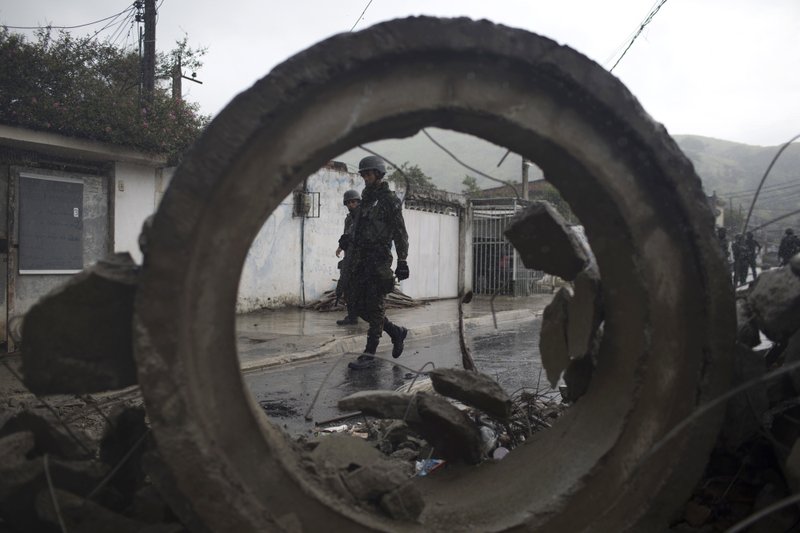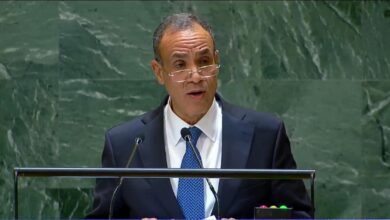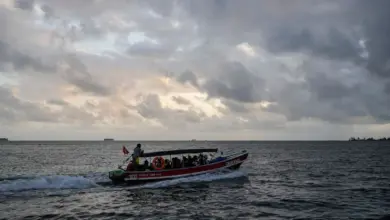
One by one, three black Brazilian men matter-of-factly give tips for interacting with police that sound very much like “the talk” that many black Americans have with their sons.
Don’t carry a long umbrella. Don’t make any sudden movements. Don’t leave home without receipts for anything valuable you’re carrying. Those are three of the many suggestions offered in the popular video that was posted online in mid-February amid a military takeover of Rio de Janeiro’s security forces.
It underscores fears that the intervention will trample the civil rights of poor people, particularly blacks, and lead to more police brutality. It also exposes a deep divide between Rio residents in affluent parts of the city and those who live in marginalized neighborhoods — who are both the primary victims of criminal violence and the attempts to crack down on it.
Rio’s police force is already one of the most deadly in the world: 925 people were killed during police operations in 2016, according to the think tank Brazilian Public Security Forum, and initial tallies by human rights groups put the 2017 number over 1,000.
The intervention “will not solve criminality or drug trafficking,” said Spartakus Santiago, a 23-year-old who works in advertising in Rio and is one of the video’s creators. “It will increase the fear of people who live in these communities, innocent people who are not involved with crime.”
On the rise for at least two years, violence in Rio appeared to reach a tipping point during Carnival celebrations this month, when thieves were caught on film chasing and beating victims along the city’s picturesque beachfront.
The governor pleaded for federal help, and President Michel Temer issued a decree that put a military commander in charge of Rio’s police. The measure has already put thousands of soldiers in the streets and is expected to sharply increase operations against drug-trafficking gangs that largely operate in favelas, or poor areas.
Whether such a measure is necessary is the focus of a heated debate. Congress overwhelmingly approved Temer’s decree, though opposition leaders accused him of using the measure to improve his popularity — he currently has a 9 percent approval rating — ahead of elections later this year. Temer denies that.
Security experts point out that many cities and states in Brazil have even higher levels of violence than Rio. Gen. Walter Braga Netto, the man overseeing the military intervention, sent mixed signals when, upon being named, he downplayed the violence in Rio by saying there were “a lot of media” covering each development.
“Rio is facing a grave state of violence, but we are not in a war,” said Renata Neder from Amnesty International Brazil. She said characterizing the situation as a war, as many politicians have in recent months, adds to the idea that more police-related deaths will be justified.
So far, the intervention, slated to last all year, is heavy on promises to crack down on criminals but light on details. Since it was announced Feb. 16, there have been several operations involving the military. As with previous troop deployments in Rio, however, soldiers have had a secondary role, setting up checkpoints and perimeters but not leading attempts to arrest armed traffickers.
Fears of police excesses were heightened when soldiers were seen searching the backpacks of young school children and taking photos and gathering information of residents of some favelas. Raul Jungmann — who at the time was the defense minister but has since been named to lead the new public security minister — shocked some when he said the government was analyzing the use of “collective” search warrants that would allow searches of whole streets or even neighborhoods, rather than a single address.
Jovacy Peter Filho, a criminal defense attorney, said broad warrants have occasionally been used in the past, and can easily be abused.
“If there is no suspicion that someone is committing a crime, any violation of his residence, of his privacy, are violations of a citizen’s fundamental right,” said Peter Filho.
There are also fears that the intervention will have profound secondary effects, such as sharply increasing the number of prisoners in already overpopulated prisons and exacerbating gang wars.
Juliana Melo, an anthropology professor and prison expert, says the intervention will likely strengthen the Primeiro Comando da Capital, the country’s most powerful gang, which operates much of its drug trade from prisons. The Sao Paulo-based gang has been working to expand nationwide, including in Rio, where another gang, Comando Vermelho, controls much of the city.
“The result (of the intervention) will be an increase in crime and a rise in the mortality and incarceration rates of black people,” she said.
Still, the biggest question mark is the future of the police force, which Gen. Braga Netto is expected to overhaul.
Changing the police culture will be a gargantuan task, particularly in the ranks of military police, whose members are not soldiers, despite the name, and normally answer to state governors. Military police, in charge of patrols and operations, are widely feared in Rio, particularly among favela residents. Officers are often accused of shooting first and asking questions later, and many are believed to have links to drug traffickers or militias, armed groups that control parts of Rio and conduct summary executions.
Even Justice Minister Torquato Jardim last year acknowledged that some military police leaders are partners in organized crime.
At the same time, being an officer is an extremely dangerous job. Last year, 134 were killed in Rio state, many hunted and gunned down while off duty. The economic crisis of recent years has meant many police are paid late, are using dilapidated equipment and are often outgunned by traffickers.
Military police officials did not respond to requests for comment for this story.
Glaucia dos Santos, who is black and lost her 17-year-old son in a military police shooting in 2014, says she fears the intervention will lead to more police violence against blacks.
Seventy-six percent of the people killed during police operations in Brazil between 2015 and 2016 were black, according to the Brazilian Public Security Forum, while just over 50 percent of the population identifies as black or mixed race.
“Are they going to Copacabana?” she said, referring to a touristy and affluent part of Rio. “No. Just to the favelas.”




